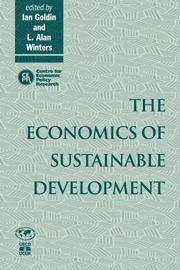Book contents
- Frontmatter
- Contents
- List of figures
- List of tables
- Preface
- Acknowledgements
- List of conference participants
- 1 Economic policies for sustainable development
- PART ONE GROWTH AND THE ENVIRONMENT
- PART TWO SUSTAINABILITY
- PART THREE DOMESTIC POLICY
- 7 Economic policies for sustainable resource use in Morocco
- Discussion
- 8 Energy pricing for sustainable development in China
- Discussion
- PART FOUR INTERNATIONAL POLICY COORDINATION
- Index
Discussion
Published online by Cambridge University Press: 04 August 2010
- Frontmatter
- Contents
- List of figures
- List of tables
- Preface
- Acknowledgements
- List of conference participants
- 1 Economic policies for sustainable development
- PART ONE GROWTH AND THE ENVIRONMENT
- PART TWO SUSTAINABILITY
- PART THREE DOMESTIC POLICY
- 7 Economic policies for sustainable resource use in Morocco
- Discussion
- 8 Energy pricing for sustainable development in China
- Discussion
- PART FOUR INTERNATIONAL POLICY COORDINATION
- Index
Summary
In their description of the water situation in Morocco in chapter 7, Goldin and Roland-Hoist expect a water shortage in Morocco in the medium term. They also point out that about 45 percent of the population lacks secure water access. From the description of the pricing of water (rural water users pay 8 percent of the price paid by urban users) those who have access to water use it until it has zero marginal product while others queue to obtain water. In their diagnosis of the problem facing Moroccan authorities in charge of designing national water policy, the authors suggest a carefully designed and comprehensive approach that relies on a balance between regional interests as well as between market and regulatory responsibility. As a first step in that process they propose a simulation analysis.
In the simulation analysis the authors assume, for every sector except rainfed agriculture, an infinitely elastic supply of water at a fixed price (in terms of the numéraire). Water enters into production as any primary factor in a standard neoclassical simulation model with first-order conditions to determine its allocation across activities. To capture the public good aspect of water use, the government receives the factor income from the sales of water, and redistributes it as a lump-sum to the representative consumer. Water does not, however, enter into the utility function. Grafted on this simple specification of water is a standard (but elaborate) treatment of foreign trade. Given these rather restrictive assumptions about the role of water, the authors examine the effects of an increase in the price of water charged to farmers and of trade liberalisations.
- Type
- Chapter
- Information
- The Economics of Sustainable Development , pp. 197 - 199Publisher: Cambridge University PressPrint publication year: 1995



